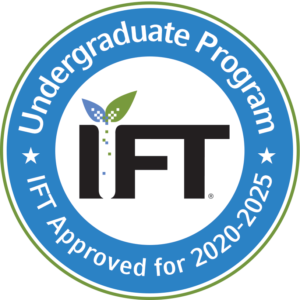Research Areas
Our lab focuses on the food carbohydrate chemistry. The overall research goal is to maximize the use of renewable and readily accessible carbohydrate feedstock in the food industry. Research topics include the interaction of carbohydrates with food components on quality, sensory, digestion, and health properties of foods; carbohydrate-derived materials with novel physicochemical and nutritional properties; and chemical modifications of carbohydrates for food applications. Additional research interests are high-intensity ultrasound, deep eutectic solvents, and food nanotechnology.
Research Project Example
Ice recrystallization is a ubiquitous thermodynamically driven process that adversely affects cryopreserved cells and foods. Inhibiting ice recrystallization is crucial to the development of high-quality frozen foods, such as ice cream. Secret ingredients have been used to inhibit ice recrystallization by ice cream manufacturers. However, it is not clear how these ingredients interact with ice and inhibit ice recrystallization exactly. Recently, we have discovered nanocelluloses as novel ice recrystallization inhibitors. We will study the structure-activity relationship of these materials and understand how they interact with ice. The completion of this project will advance our understanding of how food ingredients influence ice recrystallization, thereby benefiting the frozen food industry.

Inhibiting ice recrystallization by nanocelluloses. Biomacromolecules 2019, 20 (4), 1667-1674.

Selected Publications
- Li, T.; Zhong, Q.; Zhao, B.; Lenaghan, S.; Wang, S.; Wu, T., Effect of surface charge density on the ice recrystallization inhibition activity of nanocelluloses. Carbohydrate Polymers 2020, 234, 115863.
- Zang, Y.-Y.; Yang, X.; Chen, Z.-G.; Wu, T., One-pot preparation of quercetin using natural deep eutectic solvents. Process Biochemistry 2020, 89, 193-198.
- Li, T.; Zhao, Y.; Zhong, Q.; Wu, T. Inhibiting ice recrystallization by nanocelluloses. Biomacromolecules 2019, 20 (4), 1667-1674.
- Li, M.; Wu, J.; Chen, Z.; Wu, T. Improving the solubility of myofibrillar proteins (MPs) by mixing with sodium alginate: effects of pH, mixing ratios and preheating of MPs. Food Biophysics 2019.
- Zhao, Y.; Chen, Z.; Wu, T. Cryogelation of alginate improved the freeze-thaw stability of oil-in-water emulsions. Carbohydrate Polymers 2018, 198, 26-33.
- Zhao, Y.; Shen, W.; Chen, Z. G.; Wu, T. Freeze-thaw induced gelation of alginates. Carbohydrate Polymers 2016, 148, 45-51.
- Wu, L. J.; Wu, T.; Wu, J. Q.; Chang, R.; Lan, X.; Wei, K. L.; Jia, X. D. Effects of cations on the “salt in” of myofibrillar proteins. Food Hydrocolloids 2016, 58, 179-183.
- Hao, X. X.; Shen, W.; Chen, Z. G.; Zhu, J. M.; Feng, L.; Wu, Z. W.; Wang, P.; Zeng, X. X.; Wu, T. Self-assembled nanostructured cellulose prepared by a dissolution and regeneration process using phosphoric acid as a solvent. Carbohydrate Polymers 2015, 123, 297-304.
- Jia, X. J.; Xu, R. R.; Shen, W.; Xie, M. X.; Abid, M.; Jabbar, S.; Wang, P.; Zeng, X. X.; Wu, T. Stabilizing oil-in-water emulsion with amorphous cellulose. Food Hydrocolloids 2015, 43, 275-282.
- Wu, T.; Yu, X.; Hu, A. T.; Zhang, L.; Jin, Y.; Abid, M. Ultrasonic disruption of yeast cells: underlying mechanism and effects of processing parameters. Innovative Food Science & Emerging Technologies 2015, 28, 59-65.
Current Lab Members
- Teng Li, PhD candidate (co-advised with Qixin Zhong)
- Min Li, PhD student
- Wenhui Qi, visiting PhD student
- Safoura Ahmadzadeh, visiting scholar
- Carlos Zuluaga-Dominguez, Fulbright visiting scholar
Past Lab Members
- Ying Zhao, visiting MS student (co-advised with Qixin Zhong)
- Min Li, visiting MS student
- Ge Tian, visiting scholar
- Montenegro Josue, visiting undergraduate
- Rivadeneira Joel, visiting PhD student
